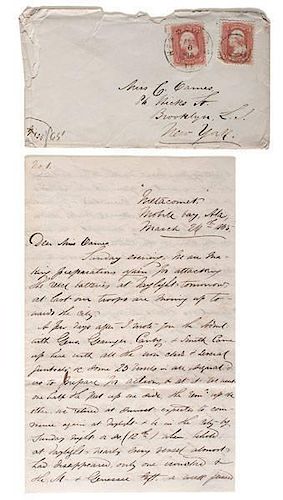Asst. Engineer George P. Hunt, ALS from Mobile Bay, March 26, 1865
About Seller
6270 Este Ave.
Cincinnati , OH 45232
United States
With offices in Cincinnati, Cleveland and Denver, Cowan’s holds over 40 auctions each year, with annual sales exceeding $16M. We reach buyers around the globe, and take pride in our reputation for integrity, customer service and great results. A full-service house, Cowan’s Auctions specializes in Am...Read more
Two ways to bid:
- Leave a max absentee bid and the platform will bid on your behalf up to your maximum bid during the live auction.
- Bid live during the auction and your bids will be submitted real-time to the auctioneer.
Bid Increments
| Price | Bid Increment |
|---|---|
| $0 | $25 |
| $500 | $50 |
| $1,000 | $100 |
| $2,000 | $250 |
| $5,000 | $500 |
| $10,000 | $1,000 |
| $20,000 | $2,500 |
| $50,000 | $5,000 |
| $100,000 | $10,000 |
About Auction
Jun 13, 2014 - Jun 14, 2014
Cowan's Auctions dawnie@cowans.com
- Lot Description
George P. Hunt served in the US Navy for over a quarter century, from the outbreak of the Civil War in 1861 until his death in 1887. His most notable service was undoubtedly his stint as assistant engineer of the USS Metacomet, ca 1864-1865, during which he took part in the Battle of Mobile Bay on August 5, 1864.
Upon entering Mobile Bay as part of Farragut's double-column of 18 ships, Metacomet participated in the capture of the Confederate ram CSS Tennessee and rescued the survivors from the USS Tecumseh, which had been sunk by a torpedo. Following the battle, both the Union and Confederate wounded were placed on Metacomet, which was permitted to pass Fort Morgan under a flag of truce on her way to the naval hospital at Pensacola.
The wooden side-wheel steamer also provided invaluable service in the months before and after the Battle of Mobile Bay in her pursuit and capture of several British and Confederate blockade runners, including Donegal, Susanna, Sea Witch, and Lilly, and participated in the covert destruction of the beached Ivanhoe. Asst. Engineer Hunt was present for all these events, and his well-written letters to his future wife provide an important first-hand account.
ALS, 15pp over four 4pp lettersheets, each 5 x 8 in., dated on the Metacomet, in Mobile Bay, March 26, 1865, with updates until April 1, addressed to Miss Eames of Brooklyn (Cordelia Eames, 1833-1900, whom he would marry Dec. 11, 1865). Hunt explains the crew is making preparations for attacking the naval batteries at Mobile the next morning, with land support of 45,000 troops under Gens. Granger and Canby, and describes the assembling of force and violent shelling of the shore over the previous week. Hunt updates the letter two and three days later with results of the attack, including the loss of Milwaukee and Osage, both of which he personally witnessed from the deck. In addition to lengthy, detailed battle descriptions, Hunt also voices his frustration with Admiral Thatcher and several army generals for ineffectual command, as he believes they should have been able to take the Mobile and the Spanish Fort weeks earlier. He even writes, If the Rebs had a smart general in command of the eastern shore, Canby's command would have been gobbled up. Letter accompanied by the original envelope and a typed transcription.Very good.Condition
- Shipping Info
-
SHIPPING. At the request of the buyer, Cowan's will authorize the shipment of purchased items. Shipments usually occur within two weeks after payment has been received. Shipment is generally made via UPS Ground service. Unless buyer gives special instructions, the shipping method shall be at the sole discretion of Cowan's Auctions, Inc.. Cowan's is in no way responsible for the acts or omissions of independent handlers, packers or shippers of purchased items or for any loss, damage or delay from the packing or shipping of any property.
-
- Buyer's Premium



 EUR
EUR CAD
CAD AUD
AUD GBP
GBP MXN
MXN HKD
HKD CNY
CNY MYR
MYR SEK
SEK SGD
SGD CHF
CHF THB
THB






